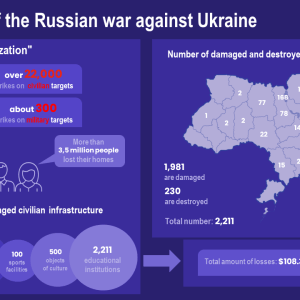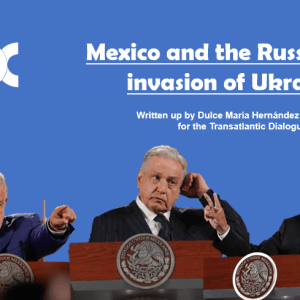
In a country, Ukraine, where not long ago people were nostalgic for the Soviet Union, today, most individuals consider themselves Europeans, and they see no alternative future except with the West’s political unions.
EU membership is now supported by a record number of Ukrainians — 91 percent, while the majority believe that the membership will follow in the coming years.
In the country where only yesterday, Belarus’ Alexandre Lukashenko was the most popular international leader, now, Boris Johnson and Joe Biden are their best friends, with the support of over 80 percent.
The country, where recently Russian content dominated the pop charts, is now banning Russian music and pro-Russian parties, all of which is approved by the majority of the population.
A majority in Ukraine, despite half its population having relatives in Russia, hates both the Russian authorities and Russians, and does not believe it will ever be possible to restore relations with them (more than 60 percent are sure of this).
But the most significant change, which is picking up momentum, is the change in self-definition by language. This is the key component of the so-called ‘Russian World’ (the concept Moscow uses for waging hybrid wars, both in Ukraine and other annexed territories).
But ironically, the aggressor’s attempt to bring the “Russian world” to Ukraine has provoked just the opposite since the start of the war — more and more Ukrainians are switching from Russian to the Ukrainian language.
Drop in Russian usage
Over the past decade, the number of those who consider Ukrainian their native language has increased from 57 percent to 80 percent, and only 16 percent considered Russian their native language, while there were more than 40 percent of the latter in 2012.
In everyday communication today, 51 percent use only Ukrainian, and another 33 percent use both languages.
And only 15 percent communicate only in Russian, and in the few months since the beginning of the war, this number has lost at least 10-percentage points. Obviously, switching to another language cannot be instantaneous, it requires some adaptation period.
However, this trend will continue to advance: two-thirds of those using two languages today are ready to switch exclusively to Ukrainian. Even a third of Russian-only speakers are ready to switch to Ukrainian.
The result of changing attitudes toward the Ukrainian language is seen in all regions, including the most Russian-speaking ones — in the south and east of the country.
Vladimir Putin, meanwhile, claims the Ukrainian language is fictional, and it is necessary to protect Russian-speakers inside Ukraine.
Yet the majority of the population (about 70 percent) believes that there is no problem among Ukrainian-, and Russian-speaking citizens in Ukraine. So, no one believes the myth that Russia came to protect Russian-speaking people.
On the contrary, when asked about Russia’s major purpose in the war, most respondents talk about the annihilation of the Ukrainian people and complete occupation — but never about protecting the Russian-speaking Donbas.
In fact, since the beginning of the war, many refugees from eastern Russian-speaking regions have fled shelling to the western part of Ukraine, which has not caused any significant language conflicts.
For example, in the fully Ukrainian-speaking city of Ivano-Frankivsk, only six percent of residents mention considerable difficulties understanding the refugees. The rest of the respondents do not have such problems.
Moreover, 80 percent want to make acquaintances and friends with displaced persons. A large percentage of Russian-speaking refugees say they try to switch to Ukrainian to communicate with the locals, and more than half think about staying to live and work in the city.
World War Two ‘nostalgia’
Another cultural and ideological gap between Ukraine and Russia, deepened by the war, is a different view of World War II and the Soviet past.
One reason for Russia’s confidence in their military strength is the powerful work of its propaganda on the invincibility of the Soviet army 80 years ago and hyperbolism about the heroism of Russian soldiers in World War II.
The modern ideology of the ‘Z’ movement in Russia’s war against Ukraine finds its antecedents in this.
Russia’s poverty and numerous internal problems are conveniently overshadowed by the cult of glorification of victory over Germany — indeed, Russia considers Victory Day on 9 May as a national holiday which shapes their identity.
The Russian invaders are doing their best to transfer this sacred tradition, the “cult of victory”, to the currently-occupied territories in Ukraine. But whereas Russians see World War II proudly with the slogan “We Can Do It Again”, Ukrainians regard the same event with a “Never Again” mindset.
Ukraine is starting to break with the 9 May tradition, to realise this event as a great tragedy with millions of unnecessary victims: today, 80 percent in Ukraine see this day as the day of remembrance for the victims of the war, although, only in 2012, the majority (74 percent) also perceived it as ‘Victory Day’.
The same applies to the ‘de-idealisation’ of Soviet-era leaders. With the cult of Stalin and Lenin taking on a new meaning in Russia, Ukrainians regard these figures as long-forgotten executioners of their nation. Before the invasion, some 50-60 percent of Ukrainians have regarded them negatively. Since the beginning of the war, some 80-85 percent share that opinion.
And before the war, a third of Ukrainians regretted the collapse of the USSR — today, only one-tenth of them do.
Regardless of age, region and language, Ukrainians increasingly realise that they all have one common enemy — Russia, which encroaches on Ukrainian statehood.
The meaning of the struggle in this war is not only for Ukraine: Ukrainians consider themselves part of Europe, so they are also fighting for the European values of freedom and democracy.
The ideology of Russia is based on the myths about the past, while Ukraine is striving to look into the future.
https://euobserver.com/opinion/154963


